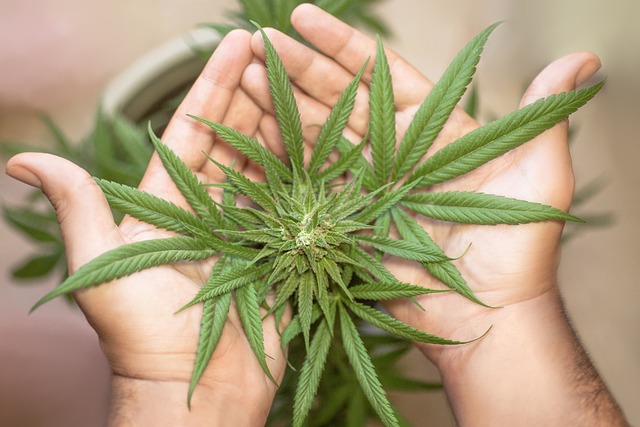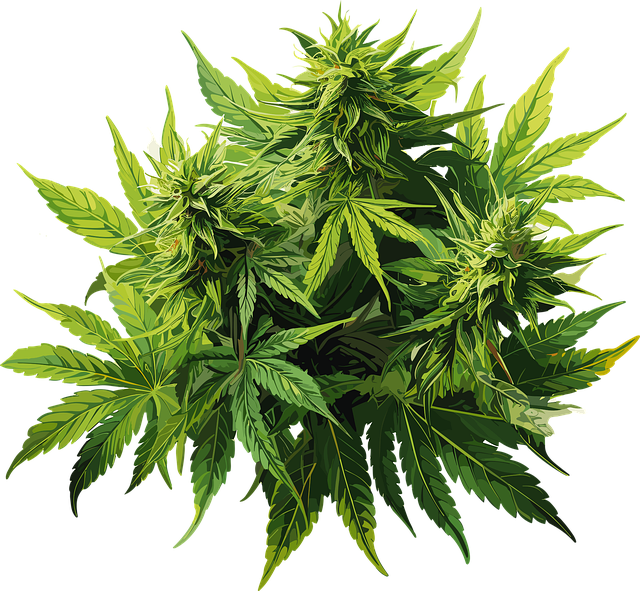THCA (tetrahydrocannabinolic acid), a non-psychoactive compound found in raw cannabis or preserved in certain products, is gaining attention for its potential to manage pain effectively. Unlike its psychoactive counterpart THC, THCA does not induce mind-altering effects, making it an appealing choice for those seeking relief. Current research suggests that THCA possesses significant analgesic properties, influencing pain perception through the endocannabinoid system, which can affect neurotransmitter release and immune responses. These effects may help alleviate various types of pain, including neuropathic and inflammatory conditions. THCA infused edibles offer a discreet, long-lasting, and precisely dosed method for experiencing these benefits. Upon metabolization, THCA is converted into THC, potentially enhancing analgesic efficacy. As the popularity of THCA infused edibles for pain relief grows, it's essential for individuals to consult healthcare professionals, given the variability in individual responses. The potential of THCA in complementary and alternative medicine for pain management is promising, with ongoing research shedding light on its analgesic role. For those considering homemade THCA-infused edibles, attention to the quality of ingredients, production transparency, and potency testing are crucial for safety and efficacy. Precise dosing is key to leveraging THCA's therapeutic effects for pain management, which requires careful extraction and precise measurement in the infusion process. Users can experience the anti-inflammatory and analgesic qualities of THCA through edibles, with a slower onset and longer duration of effects compared to other administration methods. This natural alternative to traditional pain medication offers a tailored approach to managing chronic pain conditions.
Exploring the therapeutic properties of cannabinoids has led to a growing interest in THCA-infused products as natural alternatives for pain management. This article delves into the intricate world of THC Acid A (THCA), specifically focusing on its flower form and how it can be harnessed through edibles for relief. We’ll uncover the science behind THCA’s analgesic effects, guide you through sourcing and crafting your own THCA-infused edibles, and discuss the importance of proper dosage for optimal pain management. Additionally, we’ll cover the culinary techniques for infusion, navigate the legal considerations, and suggest ways to integrate THCA flower into a comprehensive holistic health strategy. With a personalized approach to using THCA-infused edibles, this article aims to inform and empower those seeking natural relief from pain.
- Unlocking the Potential of THCA Flower for Pain Relief
- The Science Behind THCA and Its Analgesic Effects
- Sourcing High-Quality THCA Infused Edibles
- Crafting Homemade THCA Edibles for Targeted Pain Management
Unlocking the Potential of THCA Flower for Pain Relief

THCA, or tetrahydrocannabinolic acid, is a non-psychoactive cannabinoid found in the raw cannabis plant that has garnered attention for its potential therapeutic properties, particularly in pain relief. As researchers continue to explore the efficacy of THCA infused edibles and other forms of THCA consumption, there is growing evidence suggesting that THCA may possess significant analgesic qualities. Unlike its psychoactive counterpart THC, THCA does not induce a high, making it an attractive option for those seeking relief from pain without the associated psychoactive effects. The unique interaction of THCA with the body’s endocannabinoid system has been observed to influence pain perception by modulating neurotransmitter release and immune system responses, which can help alleviate various types of pain, including neuropathic and inflammatory pain.
Furthermore, THCA infused edibles have emerged as a popular method for harnessing the potential benefits of THCA for pain relief. The edible format offers a discreet, long-lasting, and often precise dosing experience. When ingested, THCA is metabolized into THC, which could potentially exert its own analgesic effects, further enhancing the overall pain-relieving experience. It’s important to note that while THCA holds promise for pain management, individual responses can vary, and it is advisable to consult with a healthcare professional before incorporating THCA infused edibles into a treatment regimen. As the therapeutic potential of THCA continues to be explored, its role in complementary and alternative medicine for pain relief is becoming increasingly clear.
The Science Behind THCA and Its Analgesic Effects

delta-9-tetrahydrocannabinolic acid (THCA) is the non-psychoactive precursor to the well-known cannabinoid delta-9-tetrahydrocannabinol (THC). Emerging scientific research has shed light on THCA’s potential therapeutic properties, particularly its analgesic effects. Unlike its psychoactive counterpart, THCA does not induce a ‘high’ and is found in raw cannabis plants or in products that have been processed to preserve its natural state. Studies indicate that THCA interacts with the body’s endocannabinoid system by binding to both CB1 and CB2 receptors, which play a role in regulating pain perception. This interaction can lead to modulation of inflammatory and neuropathic pain without the mind-altering effects associated with THC.
Furthermore, the analgesic properties of THCA have been explored in various preclinical studies, demonstrating its efficacy as a potential natural remedy for pain relief. Consumers seeking alternative treatments are increasingly turning to THCA infused edibles as a means to manage their discomfort. These edibles offer a discreet and convenient method of administration, allowing individuals to ingest precise dosages tailored to their needs. The unique molecular structure of THCA enables it to target pain pathways, offering a distinct advantage for those who prefer cannabinoid-based therapies over traditional pharmaceuticals. As research continues to expand, the role of THCA in providing natural pain relief may become more prominent in the realm of integrative healthcare practices.
Sourcing High-Quality THCA Infused Edibles

When exploring options for THCA infused edibles for pain relief, the quality of the product hinges significantly on the sourcing of its ingredients. High-quality THCA edibles are a derivative of the raw cannabis plant, containing the non-psychoactive acidic form of THC, known as tetrahydrocannabinolic acid (THCA). This compound is gaining recognition for its potential analgesic properties, making it a sought-after ingredient for those seeking natural pain relief. To ensure potency and safety, it’s crucial to choose reputable manufacturers or dispensaries that adhere to strict cultivation and processing standards. These establishments often employ state-of-the-art extraction methods to preserve the integrity of THCA, ensuring a consistent and reliable product for pain management. Consumers looking for THCA infused edibles should prioritize products that undergo third-party laboratory testing, as this verification can confirm both the presence of THCA and the absence of contaminants. Additionally, transparency in sourcing and a clear understanding of the production process are indicators of a trustworthy brand, providing peace of mind for those incorporating these edibles into their wellness regimen for pain relief.
Crafting Homemade THCA Edibles for Targeted Pain Management

Crafting homemade THCA-infused edibles offers a personalized approach to targeted pain management, leveraging the potential therapeutic benefits of tetrahydrocannabinolic acid (THCA), the non-psychoactive precursor to THC. THCA is renowned for its anti-inflammatory and analgesic properties, making it a compelling option for those seeking natural alternatives to alleviate pain. When incorporating THCA into edibles, precision in dosing is paramount to achieve the desired therapeutic effect. The process begins with accurate THCA extraction from cannabis flowers, ensuring that the edibles contain a consistent and measured amount of THCA per serving. Infusing culinary creations with THCA requires careful attention to detail, as the THCA must be evenly distributed throughout the food matrix to ensure each portion delivers a controlled dose for pain relief.
To effectively create THCA-infused edibles for pain management, it is essential to understand the potency of the THCA being used and to carefully calculate the dosages based on individual needs. Additionally, the choice of ingredients and the method of infusion, whether through decarboxylation, infusion into oils or fats, or direct incorporation into recipes, will influence the final product’s efficacy and taste. It is also crucial to consider the onset and duration of effects, as edibles can take longer to produce sensory outcomes compared to inhalation methods. Those looking to harness THCA’s potential for pain relief should approach the process with both scientific precision and culinary creativity, ensuring a safe and enjoyable experience while managing their discomfort effectively.
THCA infused edibles have emerged as a notable option for those seeking natural pain relief. This article has explored the therapeutic potential of THCA flower, delving into its analgesic properties and the science that supports its effectiveness. Readers have also gained insights into sourcing and crafting homemade THCA edibles tailored for targeted pain management. As we conclude, it’s clear that THCA holds promise as a natural alternative for pain relief, with ongoing research further elucidating its benefits. For those interested in exploring this path, careful consideration of high-quality THCA infused edible options is essential, ensuring a safe and effective experience for managing discomfort. With the right approach, THCA can be a valuable addition to one’s health regimen.
